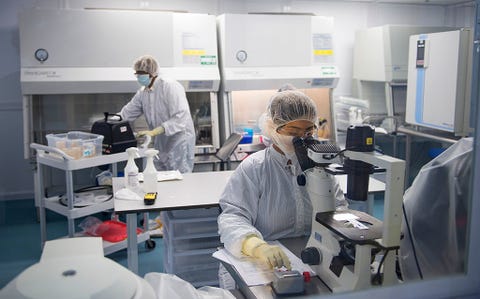The Military Wants to Create Synthetic Life Forms to Track Enemies
On battlefields of the future, the environment itself could spy on America’s enemies.
By Kyle Mizokami
GETTY IMAGES/RICK FRIEDMAN
The Pentagon is pushing to create synthetic life forms, life changed at the genetic level to serve military purposes. The military envisions common marine microorganisms engineered to release telltale signs when enemy ships pass, living camouflage, and self-healing paint. The design, manufacture, and release of synthetic life forms into the wild creates some far-reaching ethical dilemmas—should mankind modify the global environment for the purposes of war?
The Army, Navy, and Air Force are jointly supporting an initiative called the Applied Research for the Advancement of Science and Technology Priorities Program on Synthetic Biology for Military Environments. The $45 million program is working to use the process of synthetic biology to, among other things, “modify organisms for beneficial applications in areas such as performance augmentation, sensor development and materials synthesis."
Synthetic biology is generally regarded as the process of applying processes and techniques in the engineering world to the world of biology—particularly genetics. As Nature explains, all life is based on roughly the same genetic code, making it possible “synthetic biology could provide a toolbox of reusable genetic components—biological versions of transistors and switches—to be plugged into circuits at will.” This could very well mean a future in which organisms are designed by adding and removing genetic sequences responsible for certain behaviors.
What does that mean for the military? As DefenseOne points out, it means synthetic biologists could engineer marine microorganisms to release some kind of biochemical marker into the environment when they detect the telltale chemical sign of diesel electric submarines, which the United States no longer operates. A nearby drone could detect the marker and immediately report the incident to U.S. forces, allowing them to send anti-submarine units to investigate.

USS Iwo Jima, with a fair amount of rust.
U.S. NAVY PHOTO BY MASS COMMUNICATION SPECIALIST 2ND CLASS LYLE WILKIE
The possibilities are almost endless. A ship “paint” that consists of microscopic organisms could repair itself over the lifetime of the ship, cutting into the roughly $21 billion dollars a year the Pentagon spends on rust-related issues. Tanks and armored vehicles could wear a coat of organisms that change their color on command (and self-heal). Organisms might even be developed that eat solid rocket fuel and surreptitiously dropped outside caves housing North Korean nuclear-tipped missiles.
Synthetic biology is an intriguing field, but there are plenty of things to consider. Synthetic biology could open Pandora’s box, releasing new organisms into the wild with unforeseen consequences. What happens if the U.S. introduces a life form into a local ecosystem designed to eat tank armor that later spreads beyond the conflict zone and starts eating steel?
Like many new technologies that could radically reshape our world, synthetic biology comes with its own unique set of ethical issues, which take on an even sharper edge when the technology has a military application. Assuming something as relatively benign as submarine-detecting microorganisms, does any country have the right to spread synthetic organisms—particularly those with military purposes—in international waters? In a larger sense, does mankind have the right to harness the environment itself for war?
The atomic bomb’s invention took the world by surprise. Nuclear arsenals were built up practically overnight (and cities destroyed) before the bomb’s ethics could be fully explored. Unlike nuclear weapons, the world has an opportunity to take action before synthetic biology becomes commonplace. Let’s hope it does so, for everyone’s sake.
Read more at DefenseOne.
No comments:
Post a Comment